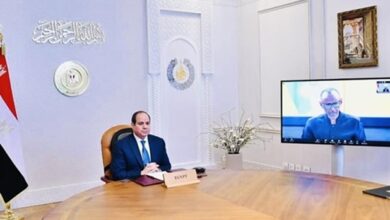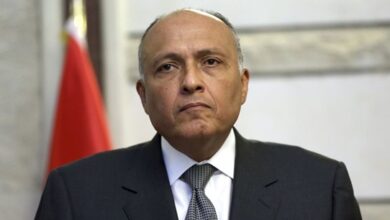For almost six years, fears of a possible transfer of power from President Hosni Mubarak to his son Gamal Mubarak have made headlines in local media, given birth to new opposition groups, and provoked thousands of protests in Egypt.
With the countdown for the upcoming 2011 presidential poll and mounting concerns over the president’s ill-health, fears that Gamal, head of the ruling National Democratic Party's policies secretariat, will succeed his father are exacerbated.
Gamal's detractors are wrapped up in their own campaigns to mobilize public opinion against him, whether through the media or through grass-roots efforts that seek to put pressure on the regime to initiate constitutional reform allowing independent candidates to challenge Mubarak Junior.
In the meantime, the ruling party continues to send out conflicting signals as to exactly which candidate it is fielding in the poll. Some insist that President Mubarak will run in the elections, while Gamal’s clientele is floating messages in favor of the president's son.
Between staunch opposition outside of his party and dubious support from the ruling regime, the question of how the 46-year-old former banker can find his way to the presidency remains murky.
“Gamal needs the full endorsement of the ruling regime as well as the approval of elements outside the ruling regime,” said Samer Soliman, political science professor at the American University in Cairo.
Soliman believes that Gamal can only garner such approval if Egypt faces an imminent threat creating a dire need to reproduce the existing political order to avoid any potential turmoil.
“He can get this approval under exceptional circumstances,” said Soliman. “[For example] if the Muslim Brotherhood decides to sharpen their teeth, or if the police instigates sectarian strife. He could gain support the same way his father got in. It is the idea of 'Me or chaos,' 'Me or the Muslim Brotherhood.'”
Whether the military will endorse a civilian president is another question, given the obscurity of the army’s stance on Gamal’s potential candidacy.
Pundits remain divided over the matter: Some believe the army would not let a civilian defeat Egypt's 48-year-old legacy of military rule, while others contend a compromise could be reached between civilian Gamal and the generals.
“This is the million dollar question,” said Moataz Abdel Fattah, Egyptian political science professor at Central Michigan University.
“One possibility is to have a military officer as vice president. [Gamal] will make clear promises that he will never go to war unless he consults with the top military generals. He will maintain their socio-economic privileges, and he will keep arms and training levels where they are now. Officers might accept this deal.”
Convincing the opposition of Gamal's legitimacy as president is another problematic task. In recent weeks, rumors had it that Gamal was planning to meet with leaders from opposition parties to persuade them to accept him as a presidential candidate.
Penetrating Egypt’s two main opposition parties, the Wafd Party and Tagammu Party, is a relatively easy endeavor, according to Mostafa Kamel al-Sayyed, political science professor at Cairo University.
“I don’t think Wafd and Tagammu can constitute any genuine opposition to the succession of Gamal Mubarak,” said al-Sayyed.
These parties could easily agree to a deal whereby Gamal would promise them a number of seats in the upcoming parliament. In return, they would not contest his legitimacy as presidential candidate or ally with his critics, explained el-Sayyed.
But the opposition is no longer restricted to officially recognized parties–which most commentators dismiss as embattled and disconnected from the masses.
Attempts to groom Gamal Mubarak to succeed his father have since 2004 led to the emergence of many informal opposition groups.
The Kefaya movement was the first of these groups that took to the streets, raising the ceiling of political opposition with their vehement criticism of Mubarak’s regime and family.
Kefeya, an elitist group comprising intellectuals and activists with different ideological leanings, spoke overtly against any hereditary succession. The movement succeeded in grabbing local and international attention ahead of the presidential elections in 2005.
Yet, the group waned and lost momentum after the re-election of President Mubarak in the same year.
A new momentum has been evolving since the beginning of the year after former head of the UN nuclear watchdog Mohamed ElBaradei announced that he would run for president if truly fair and free elections are held.
Many of the regime’s critics have rallied around the 68-year-old diplomat, forming the National Association for Change. The NAC has posed an unprecedented threat to the regime by touring the country and collecting signatures in favor of lifting the state of emergency and amending the Constitution to allow for free and fair multi-party presidential elections.
The coalition includes several intellectuals and activists who are categorically against Gamal’s ascendancy.
Thwarting such stubborn opposition could be a colossal undertaking for Gamal, yet he could still attract certain rank-and-file elements from ElBaradei’s camp, according to Soliman.
“The top leaders in the group cannot support Gamal because this would discredit them,” said Soliman. “[However] Gamal may gain the support of the second-rank activists inside ElBaradei’s coalition, but he has to promise to amend the Constitution in return and put a curb on the number of terms a president can stay in power. They may say then a bird in the hand is worth two in the bush.”
Whoever wins through, Egypt’s next president will be overburdened with an exceptionally turbulent political and social agenda.
On one hand, he will have to contain the rising social unrest engendered by skyrocketing inflation and deteriorating living conditions. With more Egyptians falling below the poverty line, the number of labor strikes and protests continues to rise.
On the other hand, the new leader will be pressed to speak to the bold demands for democratic reforms that have been formulated and widely circulated via the local private media in recent years.
According to Soliman, Gamal is incapable of diffusing such stifling social and political pressures. “There is a need for a large coalition from different segments of society to solve all these problems,” he said. “Gamal cannot form this coalition because he is tainted with the flaws of his father’s regime.”
And away from his father’s legacy, Gamal is perceived as the spearhead of the neo-liberal policies that provoked the thousands of labor strikes since 2006.
Despite his emphasis on a growing GDP, the effect of economic growth has yet to trickle has down to the one fifth of the population that lives below the poverty line.
So far, Gamal's constituency is believed to be limited to business communities and the upper-middle classes that have benefited from his economic approach and who admire his modern and secular outlook.
“If Gamal Mubarak reaches power, social protests will persist,” warned al-Sayyed.




